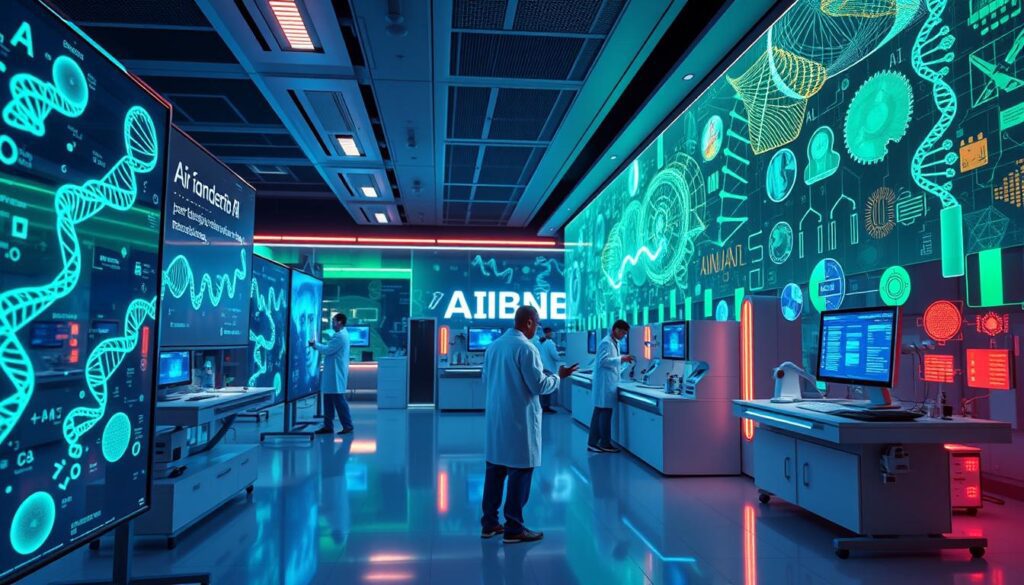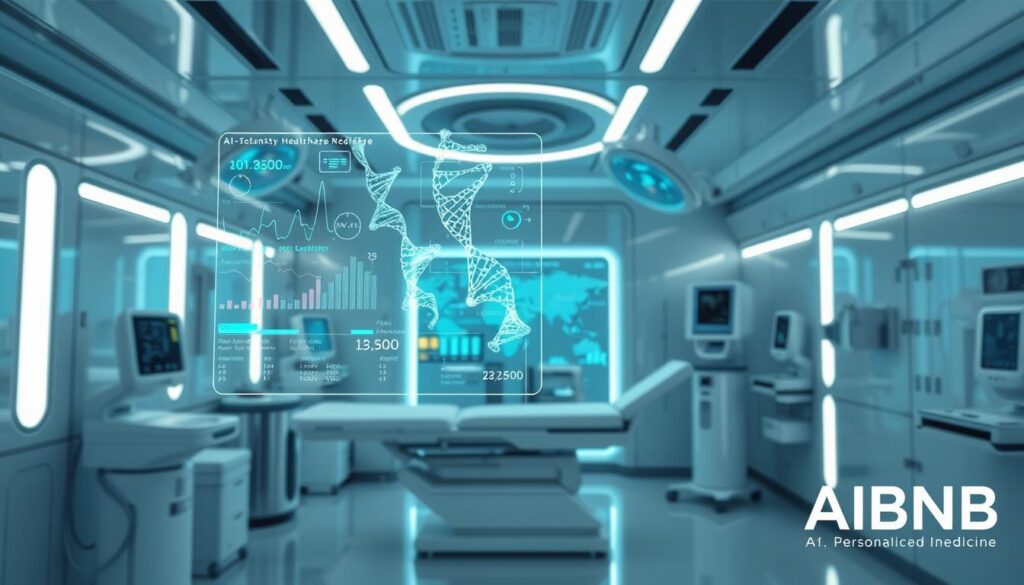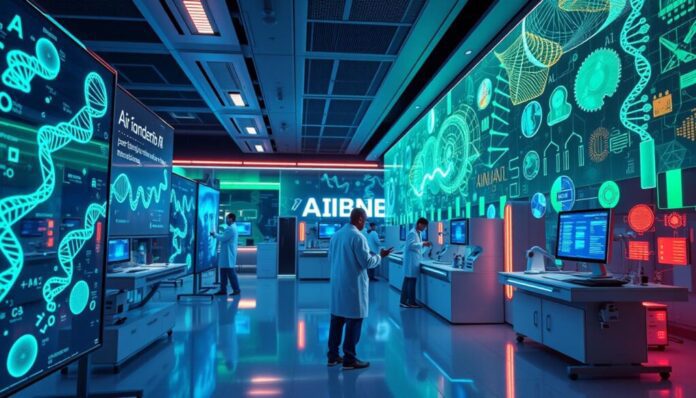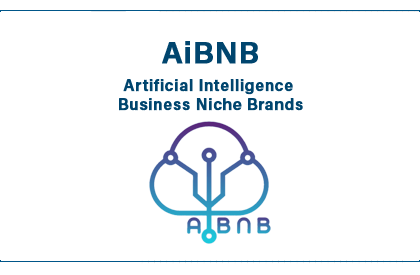AI-driven diagnostics, including genomic analysis for personalized medicine.
Artificial intelligence is revolutionizing healthcare, with ai-driven diagnostics leading the charge. Medical professionals can now diagnose diseases more accurately and tailor treatments to individual needs. Genomic analysis is key, allowing doctors to create personalized treatment plans based on a patient’s genetic makeup.
AI-driven diagnostics is crucial in modern medicine, enabling faster and more accurate disease diagnosis. This leads to more effective treatments and better patient outcomes. The integration of ai in healthcare also supports personalized medicine, tailored to each patient’s unique genetic profile.

Genomic analysis in ai-driven diagnostics is significant, enabling doctors to identify genetic mutations and develop targeted treatments. This approach has shown promising results in treating certain diseases. As ai in healthcare continues to evolve, we can expect more innovative uses of ai-driven diagnostics and genomic analysis.
Introduction to AI-Driven Diagnostics
AI-driven diagnostics is a rapidly evolving field that’s changing how medical professionals diagnose and treat diseases. AI in healthcare allows doctors to analyze vast amounts of data, spotting patterns that might elude the human eye. This leads to more accurate diagnoses and more effective treatment plans.
Key Takeaways
- AI-driven diagnostics is transforming the healthcare industry
- Genomic analysis is crucial for personalized medicine
- AI in healthcare enables faster and more accurate diagnosis
- AI-driven diagnostics improves patient outcomes
- Genomic analysis facilitates targeted treatment plans
- AI in healthcare is a rapidly evolving field
The Evolution of AI in Healthcare
Artificial intelligence is revolutionizing healthcare, with healthcare ai tools enhancing patient care and streamlining clinical processes. The integration of ai for genomic data has been pivotal, paving the way for personalized medicine and targeted treatments. As AI advances, ai-powered medical diagnostics are gaining prominence, facilitating early disease detection and more precise treatment plans.
The journey of AI in healthcare is both complex and compelling. Initially, AI was applied in medical imaging and diagnosis. Progressively, it has evolved to include ai for genomic data, allowing for the analysis of vast genetic information. This has led to the identification of patterns crucial for treatment decisions. Today, healthcare ai tools are deployed across various healthcare settings, from hospitals to research institutions.
Historical Development of Medical AI
The evolution of medical AI has been a gradual yet significant journey. Key milestones include:
- Early adoption of AI in medical imaging
- Development of ai-powered medical diagnostics for disease detection
- Integration of ai for genomic data into clinical workflows
Current State of Healthcare AI Implementation
Nowadays, healthcare ai tools are integral to various healthcare applications, from clinical decision support to personalized medicine platforms. The increasing use of ai for genomic data is evident, with many institutions investing in this technology. As AI continues to evolve, we anticipate more groundbreaking applications of ai-powered medical diagnostics and other healthcare ai tools.

Key Technological Breakthroughs
Several technological advancements have driven the development of healthcare ai tools. These include improvements in machine learning, natural language processing, and computer vision. The integration of ai for genomic data has also been facilitated by advancements in data storage and processing. As the field progresses, we look forward to even more innovative uses of ai-powered medical diagnostics and other healthcare ai tools.
| Technological Breakthrough | Description |
|---|---|
| Machine Learning | Enables the development of predictive models and algorithms for disease detection and diagnosis |
| Natural Language Processing | Facilitates the analysis of large amounts of clinical text data, enabling the identification of patterns and trends |
| Computer Vision | Enables the analysis of medical images, such as X-rays and MRIs, for disease detection and diagnosis |
Understanding AI-Driven Diagnostic Systems
AI-driven diagnostic systems are transforming healthcare by offering precise and swift diagnoses. They employ machine learning in healthcare to sift through vast medical data, encompassing images, lab results, and patient histories. This process enables AI systems to spot patterns and anomalies, guiding doctors towards more informed decisions. As a result, they can deliver ai for personalized treatments that cater to each patient’s distinct needs.
These systems find applications in several areas, including:
- Medical imaging analysis
- Lab result interpretation
- Patient history analysis
By enhancing patient outcomes, reducing costs, and improving care quality, AI-driven diagnostic systems hold immense potential.

The increasing adoption of AI-driven diagnostic systems necessitates their safe, effective, and efficient integration into clinical practices. Harnessing the capabilities of machine learning in healthcare and ai for personalized treatments can usher in a more tailored and patient-focused healthcare model.
| Application | Description |
|---|---|
| Medical Imaging Analysis | AI-driven systems can analyze medical images to detect abnormalities and diagnose conditions |
| Lab Result Interpretation | AI-driven systems can interpret lab results to identify patterns and anomalies |
| Patient History Analysis | AI-driven systems can analyze patient histories to identify risk factors and predict outcomes |
Machine Learning Algorithms in Medical Analysis
Machine learning algorithms are transforming medical analysis, allowing healthcare professionals to diagnose diseases more accurately and efficiently. The integration of precision medicine and genetic analysis software has significantly improved diagnostic accuracy. It has also reduced errors and enabled personalized treatments. Healthcare technology innovations have been instrumental in this advancement.
The benefits of using machine learning algorithms in medical analysis are numerous. They include:
- Improved diagnostic accuracy
- Reduced errors
- Personalized treatments
- Enhanced patient outcomes
Neural Networks in Healthcare
Neural networks are a type of machine learning algorithm. They can analyze complex medical data, such as images and patient records. This helps healthcare professionals identify patterns and predict patient outcomes.
Pattern Recognition Technologies
Pattern recognition technologies are designed to identify patterns in medical data. They can help healthcare professionals diagnose diseases more accurately and efficiently.
| Technology | Application |
|---|---|
| Neural Networks | Image analysis, patient record analysis |
| Pattern Recognition | Image analysis, patient record analysis |
Predictive Analytics Applications
Predictive analytics applications are used to forecast patient outcomes and identify high-risk patients. They enable healthcare professionals to provide more effective treatments. This leads to improved patient outcomes.
Transforming Medical Imaging Through AI
AI in medical research is transforming radiology, enabling personalized healthcare solutions through advanced image analysis. It leverages genomic sequencing ai to understand patient genetics deeply. This leads to more precise diagnoses and treatments tailored to each patient.
The integration of AI in medical imaging offers numerous benefits. These include:
- Image analysis: AI quickly and accurately analyzes medical images, such as X-rays and MRIs. It detects abnormalities and diagnoses conditions.
- Diagnosis: AI-powered systems enhance the accuracy and speed of diagnoses. This reduces the chance of human error.
- Treatment planning: AI aids in creating personalized treatment plans. These plans are tailored to individual patients’ needs, improving outcomes and care.
As ai in medical research evolves, we’ll see more innovative uses in medical imaging. This will lead to enhanced patient care and outcomes.
The future of medical imaging is exciting. AI-powered technologies will enable doctors to make more accurate diagnoses and targeted treatments. This will lead to better patient care and outcomes.
The Integration of AI in Clinical Practice
AI in clinical diagnostics is transforming healthcare by enhancing diagnostic precision and cutting down on errors. Advanced ai healthcare tools are pivotal in analyzing vast medical data. This enables healthcare professionals to make more informed decisions. The rise of ai-driven precision medicine is also noteworthy, offering personalized treatments based on individual patient needs.
The integration of AI in clinical practice, though, comes with its own set of challenges. A significant hurdle is the implementation of AI systems, which demands substantial investment in infrastructure and training. Yet, the advantages of AI in clinical diagnostics far outweigh the costs. For instance, AI-powered systems can significantly reduce diagnostic errors, a critical concern in healthcare.
Implementation Challenges
Challenges in implementation include data quality issues, lack of standardization, and regulatory frameworks. To address these, healthcare organizations must invest in quality data infrastructure and develop strategies for integrating AI systems into their workflows.
Success Stories and Case Studies
Success stories and case studies abound, showcasing AI’s effectiveness in clinical diagnostics. For example, a study in Nature Medicine revealed an AI-powered system’s high accuracy in detecting breast cancer from mammography images. Another study in the Journal of the American Medical Association showed a 30% reduction in radiology diagnostic errors with AI.
Best Practices for AI Integration
To ensure successful AI integration in clinical practice, healthcare organizations should adhere to best practices. These include:
- Developing a clear strategy for AI implementation
- Investing in high-quality data infrastructure
- Providing training and education for healthcare professionals
- Establishing regulatory frameworks and standards
By adhering to these best practices and overcoming implementation challenges, healthcare organizations can leverage AI in clinical diagnostics. This will lead to improved patient outcomes and cost reductions.
Genomic Data Analysis: The AI Revolution
The healthcare ai market is rapidly evolving, with a significant focus on genomic data analysis. This field has the potential to revolutionize the way we approach medicine. It enables personalized treatment plans and targeted therapies. AI-based genetic testing is a key area of development, allowing for faster and more accurate analysis of genomic data.
One of the primary applications of genomic data analysis platforms is in the field of precision medicine. By analyzing an individual’s genetic profile, healthcare professionals can identify specific genetic mutations. They can then develop targeted treatment plans. This approach has shown significant promise in the treatment of complex diseases, such as cancer and genetic disorders.
Some of the key benefits of genomic data analysis include:
- Improved diagnosis and treatment of genetic disorders
- Personalized medicine and targeted therapies
- Increased efficiency and accuracy in genetic testing
The integration of AI-based genetic testing and genomic data analysis platforms is expected to drive significant growth in the healthcare ai market. As the technology continues to evolve, we can expect to see new and innovative applications of genomic data analysis in the field of medicine.
AI-Powered Genetic Sequencing Technologies
AI is transforming genetic sequencing, making it faster and more precise. Medical ai tools are speeding up the analysis of genomic data. This leads to better patient care. Healthcare professionals can now tailor treatments to each patient’s unique needs.
The integration of AI in genetic sequencing has greatly improved its speed and accuracy. AI algorithms can quickly scan through vast genomic data, spotting patterns and anomalies that humans might miss. This efficiency has cut down the time and cost of genetic sequencing, making it more accessible.
Some of the key benefits of AI-powered genetic sequencing technologies include:
- Speed and accuracy improvements: AI algorithms can analyze genomic data faster and more accurately than humans.
- Cost reduction: Automation in genetic sequencing reduces manual labor needs, saving costs.
- Data processing innovations: AI tools can handle large genomic data sets, uncovering patterns and anomalies humans might overlook.
AI is revolutionizing genetics, enabling quicker, more precise, and cost-effective genomic data analysis. As medical ai tools and ai-powered health insights become more prevalent, we can anticipate major strides in personalized medicine and patient care.
| Technology | Benefit |
|---|---|
| AI-powered genetic sequencing | Faster and more accurate analysis of genomic data |
| Medical ai tools | Improved patient outcomes through personalized medicine |
| AI-powered health insights | More informed decision-making for healthcare professionals |
Personalized Medicine: The Future of Healthcare
Personalized medicine is a groundbreaking approach to healthcare. It tailors treatments to individual patients based on their unique genetic profiles, medical histories, and lifestyle factors. This is made possible by ai-driven diagnostics and genomic analysis. These tools help healthcare providers identify specific genetic markers and develop targeted treatments.
The benefits of personalized medicine include:
- More effective treatments with fewer side effects
- Improved patient outcomes and increased survival rates
- Enhanced patient engagement and empowerment
Healthcare providers can create personalized treatment plans using ai-driven diagnostics and genomic analysis. This approach has the potential to transform the healthcare industry. It could improve the lives of millions of people.
As the field of personalized medicine evolves, we can expect new and innovative applications. With its potential to revolutionize healthcare, personalized medicine is an exciting and rapidly developing field. It holds great promise for the future.
| Benefits of Personalized Medicine | Description |
|---|---|
| Targeted Treatments | Treatments tailored to individual patients based on their unique genetic profiles |
| Improved Patient Outcomes | Increased survival rates and improved quality of life |
| Enhanced Patient Engagement | Patients are more engaged and empowered in their healthcare decisions |
AI Applications in Treatment Planning
Machine learning in healthcare is transforming the creation of treatment plans. It analyzes vast amounts of patient data to forecast how individuals will react to various treatments. This enables the development of personalized treatments, a cornerstone of precision medicine. Precision medicine focuses on tailoring treatments to meet each patient’s unique needs.
AI is being applied in several ways to enhance treatment planning:
- Individual response prediction: AI algorithms analyze patient data to forecast responses to different treatments.
- Drug interaction analysis: AI identifies potential interactions between medications, lowering the risk of adverse reactions.
- Treatment optimization protocols: AI optimizes treatment plans by finding the most effective therapy combinations.
Through machine learning, clinicians can craft more effective treatment plans. This leads to better patient outcomes and lower healthcare costs. As precision medicine advances, we anticipate more AI applications in treatment planning.
Precision Medicine Through Genetic Analysis
Genetic analysis software has transformed medicine, enabling healthcare professionals to craft personalized treatment plans. These plans are tailored to an individual’s unique genetic makeup. This transformation is thanks to healthcare technology innovations, which have sped up and refined genetic testing.
The integration of ai in medical research has significantly boosted genetic analysis. It allows for the examination of vast data sets and the detection of patterns that humans might miss. This has led to major advances in understanding disease genetics and the development of targeted treatments.
Some of the key applications of genetic analysis in precision medicine include:
- Genetic testing for inherited disorders
- Genomic sequencing for cancer diagnosis and treatment
- Personalized medicine for complex diseases such as diabetes and heart disease
As genetic analysis continues to advance, we can anticipate even more groundbreaking uses of ai in medical research and healthcare technology innovations. With genetic analysis software, healthcare professionals will be able to offer more effective and personalized care. This will lead to better patient outcomes and a higher quality of life.
| Application | Description |
|---|---|
| Genetic Testing | Identification of genetic disorders and inherited diseases |
| Genomic Sequencing | Analysis of an individual’s entire genome to identify genetic variations associated with disease |
| Personalized Medicine | Tailored treatment plans based on an individual’s unique genetic profile |
The Role of Big Data in Medical AI
Big data is essential in the creation of ai-powered medical diagnostics. It allows machine learning in healthcare to sift through vast amounts of data, delivering precise results. The fusion of big data with ai for personalized treatments has transformed medicine. It enables more effective and targeted care.
Acquiring big data in medical AI is intricate. It involves collecting information from diverse sources like electronic health records, medical imaging, and genomic data. These data points are then scrutinized by machine learning algorithms. They identify patterns and trends, aiding in treatment decisions and enhancing patient outcomes.
Data Collection Methods
Several methods are employed to gather big data in medical AI:
- Electronic health records (EHRs)
- Medical imaging, such as MRI and CT scans
- Genomic data, including genetic sequencing and analysis
Privacy and Security Considerations
The use of big data in medical AI raises critical concerns about patient privacy and data security. It is vital to safeguard patient data, employing encryption and secure storage.
Integration with Electronic Health Records
The integration of big data with electronic health records (EHRs) is pivotal in medical AI. It facilitates the seamless sharing and analysis of patient data. This integration empowers healthcare providers to access current and accurate information. It enables them to deliver more effective and personalized care.
Regulatory Framework and Compliance
The regulatory framework for AI in healthcare is a critical aspect of the healthcare ai market. As AI-based genetic testing and genomic data analysis platforms gain traction, ensuring compliance with existing regulations is paramount. The FDA has set guidelines for AI-driven diagnostics, including ai-based genetic testing.
Key considerations for regulatory compliance include:
- Data privacy and security
- Algorithm validation and verification
- Transparency and explainability of AI-driven decisions
In the healthcare ai market, adhering to regulatory requirements is vital for the successful deployment of ai-based genetic testing and genomic data analysis platforms. By understanding and following these regulations, healthcare organizations can ensure the safe and effective use of AI-driven diagnostics and personalized medicine.
| Regulatory Aspect | Description |
|---|---|
| Data Privacy | Ensuring the confidentiality and security of patient data |
| Algorithm Validation | Verifying the accuracy and reliability of AI-driven algorithms |
| Transparency | Providing clear explanations of AI-driven decisions and results |
Future Trends in AI-Driven Healthcare
The healthcare sector is undergoing rapid transformation, with ai-driven precision medicine at the forefront. As the healthcare ai market expands, we anticipate major breakthroughs in ai-based genetic testing and tailored medical treatments.
Emerging trends in AI-driven healthcare include:
- Predictive analytics and machine learning algorithms to enhance disease diagnosis and treatment
- Increased reliance on ai-based genetic testing to pinpoint genetic disorders and craft specific therapies
- Wider application of ai-driven precision medicine across various specialties and diseases
Industry analysts predict the healthcare ai market will keep expanding. ai-driven precision medicine and ai-based genetic testing will be pivotal in this growth. As the field advances, we can look forward to AI’s innovative applications in healthcare.
The future of AI in healthcare is both promising and vast. With the healthcare ai market expanding and advancements in ai-based genetic testing and ai-driven precision medicine, patient care and outcomes are set to improve significantly.
| Trend | Description |
|---|---|
| Predictive Analytics | Using machine learning algorithms to predict disease diagnosis and treatment |
| AI-Based Genetic Testing | Using AI to identify genetic disorders and develop targeted therapies |
| AI-Driven Precision Medicine | Using AI to develop personalized treatment plans for patients |
Challenges and Opportunities Ahead
The integration of ai in clinical diagnostics has transformed the healthcare sector, allowing for more precise and swift disease diagnosis. Advanced ai healthcare tools empower doctors to dissect intricate medical data, including genomic information. This capability leads to the creation of ai-driven precision medicine, which customizes treatments according to a patient’s genetic makeup.
Some of the key benefits of ai in clinical diagnostics include:
- Improved diagnostic accuracy
- Enhanced patient outcomes
- Increased efficiency in clinical decision-making
- Personalized treatment plans
Yet, the adoption of ai-driven precision medicine also presents challenges, such as:
- Data privacy and security concerns
- High development and implementation costs
- Need for standardized regulations and guidelines
Despite these hurdles, the future of ai in clinical diagnostics appears bright. Ongoing research aims to enhance the accuracy and efficiency of advanced ai healthcare tools. As the healthcare landscape evolves, ai-driven precision medicine is set to become a cornerstone in patient care.
By harnessing ai in clinical diagnostics, healthcare professionals can unlock new avenues for enhancing patient care and advancing medical science. As advanced ai healthcare tools progress, it is crucial to tackle the challenges they pose. This ensures that ai-driven precision medicine is developed and implemented responsibly and effectively.
Conclusion
Our journey through AI-driven diagnostics, genomic analysis, and personalized medicine reveals a significant shift in healthcare. Artificial intelligence now allows doctors to make more precise diagnoses and tailor treatments to each patient. This marks a major leap forward in medical care.
AI has transformed precision medicine through advanced genomic sequencing and data analysis. Healthcare professionals can now make better decisions and offer therapies that are custom-made for each patient. This shift towards AI-driven healthcare promises better patient outcomes and a more efficient medical system.
Despite ongoing challenges like regulatory hurdles and data privacy issues, the future of AI in healthcare looks promising. As technology advances and healthcare systems evolve, patients will see the benefits of AI’s enhanced capabilities and personalized approach. This is a new era for medical care.
FAQ
What is AI-driven diagnostics, and how is it transforming healthcare?
AI-driven diagnostics use advanced AI and machine learning to enhance medical diagnosis and treatment. It analyzes large datasets, including medical images and genomic data, to identify patterns. This leads to earlier disease detection and more tailored care.
How has the role of AI in healthcare evolved over time?
AI’s role in healthcare has grown from medical imaging to genomic analysis and personalized medicine. Breakthroughs in neural networks and predictive analytics have made AI a powerful tool. It now improves diagnostic accuracy and efficiency.
What are the key components of AI-driven diagnostic systems?
AI diagnostic systems use machine learning algorithms to analyze large datasets. These algorithms identify patterns for diagnosis and treatment. They provide personalized insights for more effective interventions.
How do machine learning algorithms improve medical analysis and diagnostics?
Machine learning algorithms analyze medical data to find patterns for diagnosis and treatment. They detect subtle anomalies and make accurate predictions. This reduces errors and enables personalized medicine.
What is the impact of AI on medical imaging and diagnosis?
AI transforms medical imaging by improving analysis and diagnosis speed. It detects subtle abnormalities and reduces human error. This leads to better patient outcomes.
What are the key challenges and considerations in integrating AI into clinical practice?
Integrating AI into clinical practice faces challenges like implementation hurdles and data privacy concerns. Yet, successful cases and growing evidence show AI’s benefits. This leads to increased adoption in healthcare.
How is AI revolutionizing genomic data analysis and personalized medicine?
AI is crucial in genomic data analysis, enabling faster and more accurate genetic testing. It supports personalized treatments by processing complex genomic data. This accelerates the shift to precision medicine and improves patient outcomes.
What are the key applications of AI in treatment planning and optimization?
AI enhances treatment planning by predicting patient response and analyzing drug interactions. It helps develop personalized treatment protocols. This tailors treatments to individual needs, improving intervention efficacy and reducing adverse effects.
How is big data and data integration impacting the development of medical AI?
Big data and data integration are driving the development of more accurate medical AI. They enable AI models to make informed diagnoses and predict treatment outcomes. This supports personalized medicine.
What are the key regulatory considerations for the use of AI in healthcare?
AI in healthcare is governed by a complex regulatory framework. This includes compliance, data privacy, and guidelines for AI development and deployment. Healthcare providers and companies must navigate these to ensure AI’s safe integration.
What are the future trends and predicted developments in AI-driven healthcare?
AI will continue to transform healthcare, advancing in predictive analytics, drug discovery, and personalized medicine. Experts foresee new AI technologies, increased AI integration, and evolving regulations for responsible AI use.
What are the key challenges and opportunities in the future of AI-driven diagnostics?
The future of AI diagnostics faces challenges like data privacy and the need for robust regulations. Yet, AI offers significant opportunities. It can enhance diagnostic accuracy, reduce errors, and enable personalized treatments, leading to better patient outcomes.
| Thank You for choosing AIBNB |
ai-driven diagnostics, genomic analysis, personalized medicine, AI in healthcare, healthcare AI tools, AI for genomic data, AI-powered medical diagnostics, machine learning in healthcare, AI for personalized treatments, precision medicine, genetic analysis software, healthcare technology innovations, AI in medical research, genomic sequencing AI, personalized healthcare solutions, AI in clinical diagnostics, advanced AI healthcare tools, AI-driven precision medicine, healthcare AI market, AI-based genetic testing, genomic data analysis platforms, AI for predictive healthcare, medical AI tools, AI-powered health insights.
ai-driven diagnostics, genomic analysis, personalized medicine, AI in healthcare, healthcare AI tools, AI for genomic data, AI-powered medical diagnostics, machine learning in healthcare, AI for personalized treatments, precision medicine, genetic analysis software, healthcare technology innovations, AI in medical research, genomic sequencing AI, personalized healthcare solutions, AI in clinical diagnostics, advanced AI healthcare tools, AI-driven precision medicine, healthcare AI market, AI-based genetic testing, genomic data analysis platforms, AI for predictive healthcare, medical AI tools, AI-powered health insights.




